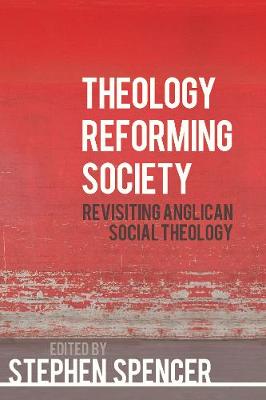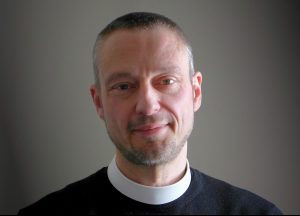Edward Carter: “Theology Reforming Society – Revisiting Anglican Social Theology” edited by Stephen Spencer

Theology Reforming Society – Revisiting Anglican Social Theology arose out of a 24-hour conference held at Mirfield (a monastic community where Anglican ministers are also trained) in January 2017, on Anglican Social Theology. The various contributors were admirably swift in shaping and adapting their papers into a publishable form, and, for those who had not attended such as me, the resulting book brings the conference to life in a manner that is sometimes difficult to do. I found myself wishing that I’d been there.
Stephen Spencer’s introduction sketches out a loose definition of Anglican Social Theology (AST) as being something that attempts to ‘change the structures of society as a whole through changing relationships across social groups’ (page xii), and then outlines the historical shape of the tradition with reference to certain key people and church bodies. This sets the scene for eight different authors’ varied but complimentary chapters, followed by an Afterword from Peter Manley Scott. Each contribution stands alone, but there are good cross-references made.
Chapter 1 is by Jeremy Morris, and looks at F.D. Maurice, often felt to be the founding father of AST in the nineteenth century. I found this to be scholarly but very readable. Alison Milbank, in chapter 2, then takes the Maurice heritage and interprets it for today. I found at least two gems in her contribution, not least her comments on the proper place for nationalism.
Chapter 3, not in fact part of the January 2017 conference, is a short interpolation by Diane Ryan on Octavia Hill, who was deeply influenced by Maurice and is famous for her work as a reformer of the Victorian era, notably in social housing. This chapter is a clear and straightforward description drawing skillfully on a number of sources, but for me the comments Ryan makes about Hill’s emphasis on natural beauty, and its link to the inner, moral ‘beauty’, were particularly interesting. I found myself engaged by Ryan’s suggestion that this is perhaps one of the distinctive features of an English, if not Anglican, theology.
Chapter 4 is a very informative contribution from Paul Avis, shedding light on the significance of Brooke Foss Westcott, Henry Scott Holland, and Charles Gore, all in some sense inheritors and developers of the F.D. Maurice tradition. While broadly descriptive, Avis opens up plenty of ground for thoughtful engagement. For example, his account of Westcott on ‘progress’ (pages 59-60) set off all sorts of ideas in my own mind. Gore comes across as a thoroughly modern Bishop, ‘an inspirer and organiser of initiatives and projects – a strategist…’ (page 71), with probably too strong a focus on the life of the church. I had the feeling he would have thrived in today’s Church of England.
In chapter 5 Stephen Spencer describes William Temple’s towering role within the AST tradition. However, I found this chapter to be especially skillful in tilting history forwards so that it meets the present. Spencer achieves this by putting Temple in dialogue with Rowan Williams so as to elucidate an attractive description of how an individual relates to the state, and in some sense is superior to the state. Christianity and Social Order, Temple’s well-known 1942 book, is brought into the discussion, and I enjoyed reading again the eight policy recommendations that Temple added in an appendix (page 100). They suddenly seemed extremely current and relevant, for example the suggestion that labour should be represented on the directorates through the Unions, which is once again the subject of a lively political debate. I found myself re-assessing Archbishop Justin Welby’s September 2018 speech to the TUC as flowing directly from Temple. Spencer, of course, is not engaged in hagiography. Rather, he ends by pointing out that the Temple approach has become very influential in almost every space except the church.
Chapter 6 sees Susan Lucas bringing the Temple legacy more deliberately into dialogue with today’s world, and as a tool in the hands of today’s rather different church. I felt Lucas was the most successful contributor in making the AST tradition live, as a central part of the task facing Christians today, post-Brexit and in the Trump (if not quite Corbyn) era, perhaps because she is a parish priest in East London. Her description of the church needing to ‘recover again a vocation to be gracious at the margins…’ (page 110) with true prophetic imagination made me nod in agreement, and her concise description of the problems with neoliberalism is brilliant.
In chapter 7 Malcolm Brown has space to reflect on the 2014 book, Anglican Social Theology, which he put together and edited in response to a request from a number of Bishops. This allows him to develop the suggestion that the need to locate the evangelical tradition securely within (or alongside) AST has become the most pressing task. The changing political landscape also allows Brown to propose the idea that Anglicanism, a ‘contested tradition’ (page 126) is uniquely placed to speak into the highly contested contexts of today’s world.
Matthew Bullimore brings the main series of contributions to a close with chapter 8, a discussion weaving together Augustine’s two cities, William Temple, and the contemporary ecclesial way of doing ethics. I found this slightly pedestrian and somewhat defensive of the Hauerwasian method. This is followed by Peter Scott’s afterword, in which the idea that AST is distinctive for its pastoral style is floated and discussed.
I enjoyed this book, which while being properly scholarly has a liveliness that hints at its genesis at what was clearly a fine conference. For someone who knows relatively little about AST, or indeed public theology, it would make a challenging but good introduction that feels contemporary and relevant. In places the book also hints at the rapidly changing landscape, and so leaves me hopeful that there will be increasingly more to come from these and other authors, and that AST will be something of a strengthening counter-weight to the church’s tendency to look inwards and become preoccupied with its own initiatives, however laudable they seem to be.
“Theology Reforming Society – Revisiting Anglican Social Theology” Edited by Stephen Spencer was published in 2017 by SCM Press (ASIN B079KXQYB). 188pp.
Edward Carter is Vicar of St Peter Mancroft Church in Norwich, having previously been the Canon Theologian at Chelmsford Cathedral, a parish priest in Oxfordshire, a Minor Canon at St George’s Windsor and a curate in Norwich. Prior to ordination he worked for small companies and ran his own business.
He chairs the Church Investors Group, an ecumenical body that represents over £10bn of church money, and which engages with a wide range of publicly listed companies on ethical issues. His research interests include the theology of enterprise and of competition, and his hobbies include board-games, volleyball and film-making. He is married to Sarah and they have two adult sons.

